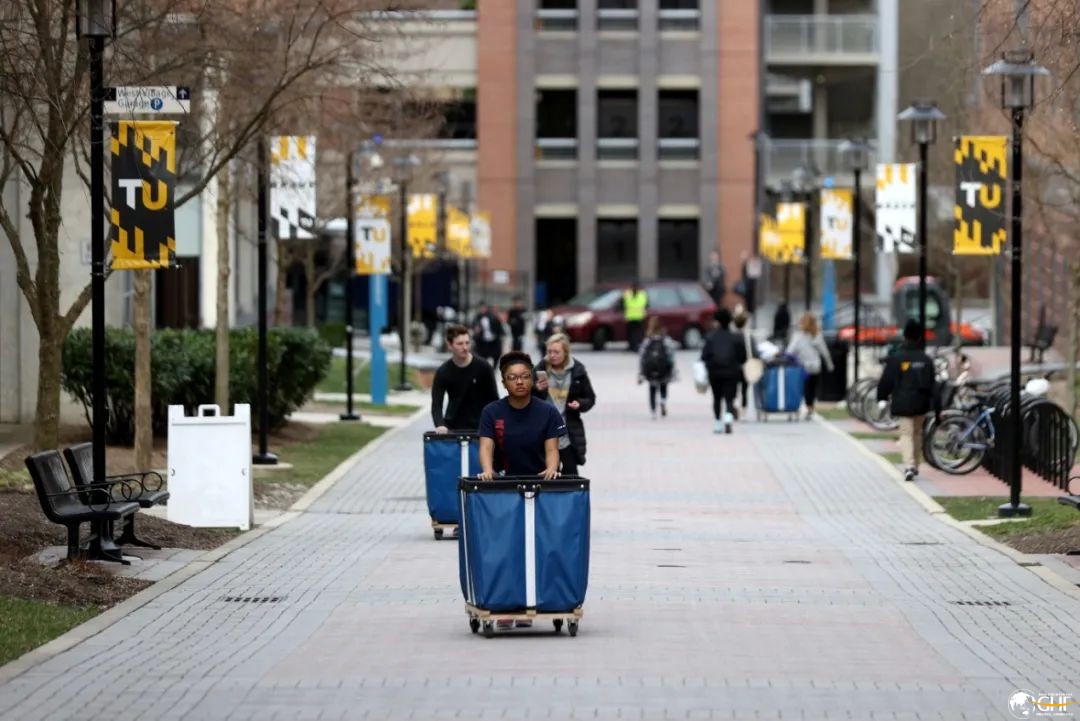Hua Chunying, spokesperson of the Ministry of Foreign Affairs, introduced at the regular press conference of the Foreign Ministry held today (on the 1st) that considering the current situation of the epidemic in the UK and the various difficulties faced by local Chinese students, the Foreign Ministry is actively coordinating with civil aviation and other departments to increase the number of temporary flights to the UK tomorrow (on the 2nd) to facilitate the return of overseas students with difficulties. (By Huang Huixin and Jin Danni, CCTV)
Related articles: [International students in the UK: 70% to 80% want to return home]
Recently, the Covid-19 epidemic is under control in China, but is developing rapidly elsewhere in the world. A large number of Chinese students who are far away from home are caught in the dilemma of choosing whether to return home or stay. Especially in big countries like the U.S. and the U.K., the epidemic is out of control and makes students feel stressed, but they are also worried about facing various obstacles such as cabin infection, flight grounding and sky-high airfare if they return home.
At the same time, the emergence of some unfriendly voices on the Internet against international students has also increased the anxiety of many overseas students. The Global Times interviewed several overseas Chinese students from regions with severe epidemics, some of whom were preparing to "challenge" their way back to their home countries, while others had to stay there for other reasons. They told the journalist about the tension of living in another country, the "long journey home", and their experience in self-protection abroad.
Sky-high airfares and temporary suspension of flights
Since the outbreak, the tickets of flights to and from Europe and China have been hard to buy. The South China Morning Post previously reported that the cost of chartering a plane for 60 people is about 2 million yuan, which translates to about 35,000 yuan per passenger. An Italian Chinese told the Global Times that it cost him nearly 50,000 yuan to return home on a business charter flight. On the other hand, one-way tickets to Beijing or Shanghai from San Francisco, California, one of the worst areas of the epidemic in the United States, jumped from the usual price of less than $1,000 to $3,000-4,000, almost a quarter's rent for students.
"Some students returned home by connecting flights in Germany and Russia before the city was closed." Liu, a student studying in Florence, Italy, said that there are few connecting lines left. "A few days ago friends planned to depart from Rome via Moscow, but the flight was temporarily grounded and their group of three people were stuck in Rome." The journalist saw many people posting on the forum of Chinese students in Italy to discuss the "return route" and "return isolation".
Xu, who studies in Milan, said, "I was torn at first whether to 'go back' or 'stay'. I was worried about staying and the risks on the way back home. I booked a flight with Emirates, but the day before I left, I was informed that the flight was cancelled. After this I was not so torn. It's safest to stay."
Preparing for the "long journey home" for months
Wu, who studies in London, England, may be considered a slightly "lucky" dog. After a month of anxiety, she finally grabbed a ticket back home in the early morning of mid-March, "If the flight doesn't stop flying, I may finally be able to leave".
Wu told the Global Times that when British colleges and universities started in January, when the epidemic in China was relatively severe, people were busy with classes while worrying about their families, and most of them had no intention of returning to China. "In February everyone began to be anxious, generally this is the period to arrange the Easter holiday in April, but because of the epidemic, many people canceled their travel plans. In March, the return to China became a big trend."
According to Wu's recall, in early March, the flights from the United Kingdom back home still cost four or five thousand yuan, but now the date available for purchase is getting later and later, "the flights in 10 days can be less than 10,000 yuan, if you hesitate a little, you have to delay your trip. Good tickets are immediately bought away, and the price soared to tens of thousands of yuan."
Currently, returning to China has become the choice of 70% to 80% of people around Wu, classmates, friends and strangers from the same apartment are “squatting” on the airline's website late at night with their relatives at home. "Previously sublet groups of rentals were sizzling, now at a discounted price, even with giving away masks, the house can not be rented out." And the wasteful rent, the difficulty of having to communicate with mentors online, and the luggage that cannot be taken away, "are annoying, but not yet as important as life."
Before embarking on the journey back home, Wu had prepared various protective materials long before. "Long-distance flights are dangerous, and I have prepared protective clothing, goggles, masks, hands-free hand sanitizer, alcohol spray, and disposable gloves and footwear. Overly stuffy protective clothing can also cause a rise in body temperature, which often has an impact when taking temperatures." The crowded conditions on the flight also worried Wu, fearing that healthy people might also be infected after a long trip.
Fear of anti-Chinese sentiment
Along with life safety is the psychological pressure this global outbreak has put on international students. After New York State was declared a "major disaster area" by President Donald Trump, there has been chaos in Manhattan and other crowded areas, including looting. Zhang, a graduate student on Long Island, told the Global Times, "My biggest fear is not the epidemic, but the anti-Chinese sentiment.
"Sometimes when I take a taxi to the supermarket to stock up, I see that there are Americans stocking up on bullets." Fearing the mix of people, Zhang has stopped taking public transportation for a long time, usually staying in her dormitory and not going out, only going to nearby supermarkets to buy supplies when necessary. She told the journalist that even though the epidemic was so serious, the school and community sent emails telling people "not to wear masks," and she didn't dare to wear one herself because she was "afraid of being hit”.
In response to the question about whether she was considering returning to her home country, she said she would wait and see for a while, "One is that the flight is very uncertain now, and the other is that she is afraid that she will not be able to return to school, which will affect her studies. However, she said she has bought a full set of protective clothing, goggles and other equipment, once there is the opportunity to return home, she will be "fully armed" up.
Besides political factors, there are also many other difficulties that cause headaches for Chinese students staying abroad. Wang, a phd student in California, was unable to return home for personal reasons. She told the Global Times that most colleges and universities in the U.S. have closed their libraries and laboratories, making it impossible for students to do their studies and research properly, which affects the progress of graduation and visa deadlines. Some schools even closed their student dormitories and some private landlords terminated their contracts, leaving individual international students without a place to live.
Because of the closure of school cafeterias and services, students without private cars had to solve basic living problems by ordering meals and supermarket deliveries, "such services are generally more expensive in the U.S., resulting in a significant increase in the cost of living." With masks, disinfectant and other necessities still out of stock during the epidemic, students had to stay out of their homes and were unable to protect themselves when they needed to go out in an emergency. With most departments on campus closed and off-campus businesses closed, international students who work part-time in their spare time have become "unemployed" and some may not be able to afford their rent and living expenses.
Most of the Chinese students interviewed by the Global Times are not considering returning to China at this time because they want to overcome the difficulties of completing their studies as planned and to minimize population movement and prevent infection. Many students are already actively considering coping measures such as home quarantine and online learning, and international students at some schools have formed mutual support groups to share their experience with online learning, purchasing supplies, and living in quarantine to relieve stress.

Colleges and universities across the U.S. closed their campuses to prevent the epidemic, and students had to move out of their dormitories for a limited period of time. Pictured are students at Towson University in Maryland, where a state of emergency was declared earlier this month due to the outbreak.
Fully cooperating with quarantine requirements
"I saw online earlier that our international students 'threw themselves on the poison for thousands of miles,' and I felt quite bad," Xu told the Global Times with regret. "Although I didn't go back, I can understand the students who went back. Everyone just really wanted to go home."
Many Chinese students were relieved to see the number of new cases at home gradually declining, and their worries about their loved ones at home were eased. However, due to the increase in imported cases, some voices on the Internet have been unfriendly to international students. "I don't want to take the risk to go back home, and I don't want to affect my countrymen", Liu told the journalist, "The achievements of fighting the epidemic now are hard-won, and I don't want to go back to make trouble to my country and hometown".
Wu told the journalist that the students around him were always concerned about the changes in domestic policies. "At the beginning, the UK was not part of the serious area of the epidemic, but after the emergence of imported cases, we were also compiled into the team that needed to unify the quarantine, and our parents at home were inquiring whether they needed to contact the local quarantine staff in advance, and where the flights landing in Beijing would be assigned to check the epidemic prevention." Wu told reporters that the more troublesome the quarantine measures were, the more at ease the students were instead. "We were worried that we would make mistakes in the process and cause trouble for the quarantine officers. But all in all, quarantine is not a problem no matter where we go, as long as we can return home without any problems."

The Chinese students in New York sent the Global Times their own shopping list of protective clothing, goggles, rubber gloves and other quarantine supplies.
Source: By Han Shuo in Italy and Tian Qiu in the United States and Zhang Xueting in China
Editor: Wang Yi



 Reports
Reports
 Partner application
Partner application Download
Download Hot News
Hot News









